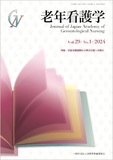Japanese
English
- 販売していません
- Abstract 文献概要
- 参考文献 Reference
抄録
本研究は,介護保険施設等に勤務する認知症看護認定看護師が重度認知症高齢者の意思を捉えるためにどのように考え,関わっているのかを明らかにすることを目的とした. 対象者は重度認知症高齢者のケアを実践している認知症看護認定看護師8人である.データ収集は面接調査を実施し,重度認知症高齢者の意思を捉えるためにどのように考え,行動しているのかについて,実際の看護場面を想起しながら自由に語ってもらい,質的統合法(KJ法)で分析を行なった.その結果,認知症看護認定看護師は,重度認知症高齢者の意思を捉え尊重するという責任の自覚を基盤に,重度の認知症であっても意思がある存在であることを前提に意思表示する力を引き出し,非言語的なメッセージや過去を紐解きながら意思を捉えていた.さらに意思を捉え尊重するための体制づくりや,多職種協働によって多角的に重度認知症高齢者を理解し意思を捉えることを強化していることが明らかとなった.
Older adults with advanced dementia to grasp their intentions. The subjects were eight certified nurses in dementia nursing who were providing care to older adults with advanced dementia. Data was collected by interview surveys in which, while recalling actual scenes of nursing, the subjects freely talked about how they think and behave to comprehend the thoughts and intentions of older adults suffering from severe dementia. The collected data was analyzed using the qualitative synthesis method (KJ Method). The results revealed that, being aware that grasping and respecting the intentions of older adults with advanced dementia was their responsibility, and that these patients have their thoughts and intentions even if they have severe dementia, the subject nurses grasp those intentions by eliciting their patients' faculties to indicate intentions and by unraveling non-verbal messages and stories of their past. Furthermore, it became clear that these nurses were leading efforts to help the staff in their facilities, including those of other professions, better understand older adults with advanced dementia from multiple perspectives and grasp their thoughts and intentions by providing education to build an organizational climate and promoting multi-disciplinary collaboration.
Copyright © 2024, Japan Academy of Gerontological Nursing All rights reserved.


